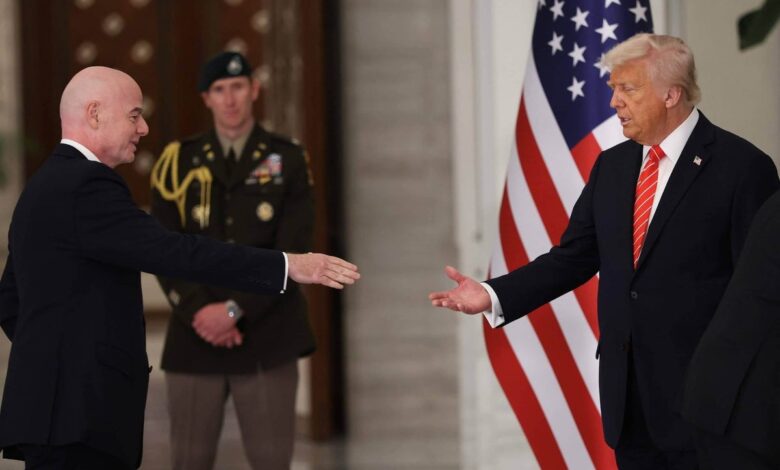FIFA urged to use ‘influence’ over President Trump’s ‘abusive’ immigration policy ahead of World Cup

FIFA president Gianni Infantino has received a letter signed by over 90 civil society groups, the majority of which are based in the United States, expressing “deep concern” about immigration policies and enforcement measures in the U.S. and their potential impact on the World Cup in 2026.
The letter urges FIFA to use its “influence” to call on the administration of President Donald Trump to guarantee the fundamental rights of the millions of football fans who will seek to attend the World Cup next summer. The groups reference Infantino’s “high-profile engagements” in the White House and his recent trip to Saudi Arabia and Qatar, when he accompanied President Trump at an investment summit as evidence of his proximity to the U.S. President.
The letter asks FIFA to leverage its position to “publicly” urge President Trump to reverse policies and practices that the groups say pose risks to both foreign tournament attendees and migrant communities living within the U.S. The letter goes on to warn that if FIFA continues to remain silent, then “the FIFA brand will be used as a public relations tool to whitewash the reputation of an increasingly authoritarian government.”
The letter says: “We call on FIFA to use its influence to encourage the U.S. government to guarantee the fundamental rights of the millions of foreign visitors and fans who seek entry to the U.S. to attend the tournaments, and those of the constitutional rights of the many immigrants who already live, work, and contribute meaningfully to the cities selected to host them.”
The letter, which has been seen by The Athletic, is co-signed by groups including Human Rights Watch, Amnesty International and NAACP, an American civil rights organization founded in 1909, as well as the 105-year-old American Civil Liberties Union (ACLU). Civil society groups and unions based in New York, Florida, Georgia, California, Texas, Massachusetts, Missouri, Pennsylvania, all states which will host World Cup fixtures, have signed the letter.
The letter was co-ordinated by the British advocacy group Fair Square, in collaboration with several of the signatories. It was sent to FIFA on the morning of July 1, addressed to Infantino and copying in senior officials including Carlos Cordeiro, the former U.S. Soccer president who now serves as an advisor to Infantino. The letter was also copied into the FIFA COO Kevin Lamour, its World Cup COO Heimo Schirgi, as well as its director of government relations Alex Sopko and chief strategy officer Amy Hopfinger. The letter also copied in Matthew Mullen, the FIFA Head of Human Rights specifically for the World Cup, in 2026, which will be co-hosted by the U.S., Canada and Mexico.
Minky Worden, the director of global initiatives at Human Rights Watch, told The Athletic this type of intervention is “very uncommon in the context of any U.S. mega-sporting event”, which underlines the concern felt by the signatories about the current climate in the U.S.
The letter points to the series of executive orders and policy changes implemented by President Trump since his inauguration in 2025. The administration argues these orders are in the interests of national security and public safety.
In their letter, however, the rights groups say they are concerned for the projected 2.6 million visitors projected to attend the World Cup in 2026.
The letter says: “Increased immigration enforcement actions, abusive Immigration and Customs Enforcement (ICE) operations, and broader border restrictions have also contributed to widespread fear and uncertainty. Several foreign governments have already issued travel advisories to its citizens, warning of risks of being denied entry or detained and deported when traveling to the U.S.”
Infantino has aligned himself closely with Trump ahead of next year’s World Cup (Jim Watson/AFP via Getty Images)
There has been evidence of reduced inbound travel to the U.S., with Republican congressman Darin LaHood last week expressing concern about a 40 per cent reduction in travel to the U.S. from Canada amid a trade war, while he added that tourism in Las Vegas, New York and Florida is down.
The letter points to the imposition of travel bans by the Trump administration against nationals from twelve countries, which threatens to exclude Iranian football fans from the World Cup, as their team has already qualified for the tournament, as well as partial restrictions on seven more nations including Venezuela, who are in contention to qualify. The groups also reference reporting from the New York Times, which claimed that 36 more countries, many of which are African, could be added to the list.
The letter warns that “spectators from other countries remain subject to invasive and burdensome vetting procedures and the possibility of being denied travel authorization or entry due to their political or religious views.”
The groups also point to concerns about the alleged “cruel, inhuman and degrading treatment” within U.S. immigration detention facilities.
The letter says that the success of a World Cup depends not only on infrastructure and logistics, but also the “spirit of openness and safety extended to all who participate and attend”.
Infantino insisted at the FIFA Congress in May that the world is welcome in America, saying in Paraguay: “Of course, the players, of course, everyone involved, all of us, but definitely also all the fans.”
The U.S. vice-president J.D. Vance said in May: “Of course everyone is welcome to come and see this wonderful event. We want them to come, we want them to celebrate, we want them to watch the games.
“But when the time is up we want them to go home, otherwise they will have to talk to Secretary Noem,” he continued, referring to Kristi Noem, the Secretary of Homeland Security.
The letter argues that FIFA, in accordance with its own Human Rights Policy, has a “responsibility to act.”
The letter says: “The policy specifically identifies that ‘providing for the safety and security of people who are attending or are otherwise involved in or affected by FIFA’s events may impact certain fundamental human rights, such as freedom of movement, expression and assembly’ as one of FIFA’s five salient human rights risks.”
It continues: “People of all nationalities should be able to travel to the United States without fear of arbitrary denial of entry, arbitrary detention, or deportation without due process, and people in the United States should be able to exercise their right to freedom of expression without fear of arbitrary detention and deportation, and migrant communities should not live in perpetual fear of CBP and ICE raids.”
The CBP provoked alarm before this summer’s FIFA Club World Cup when it posted on Facebook that its agents would be “suited and booted ready to provide security for the first round of games.”
The Athletic revealed that the post was removed after direct contact from senior personnel at FIFA expressing concerns, but it is not clear as to the extent to which FIFA’s outreach impacted the decision.
NBC Miami reported that ICE confirmed that they would be present at games as part of the security operation, while also including a reminder that non-American citizens should carry proof of their legal status. Attendances for the Club World Cup have been mixed, with some matches close to full and some leaving tens of thousands of seats empty.
FIFA, which has been approached for comment about the letter to Infantino, has faced numerous questions over its commitment to human rights after holding its previous two men’s World Cups in Qatar and Russia, while the 2034 edition will be held in Saudi Arabia. Eleven leading human rights organisations have previously criticised a 39-page document published by the world football governing body FIFA by the Saudi arm of the global law firm Clifford Chance. The groups claimed it represented a “flawed” assessment of Saudi Arabia as the country bid to host the World Cup.
FIFA is currently hiring for a Head of Human Rights & Anti-Discrimination, according to a job posting on its webpage. The posting says the applicant must have 10 years experience as a human rights executive, must demonstrate high ethical standards and personal integrity, and have experience working with marginalized and vulnerable people. Among the key tasks will be to ensure the active and transparent communication of FIFA’s human rights work.
(Top photo: Win McNamee/Getty Images)
Source link




